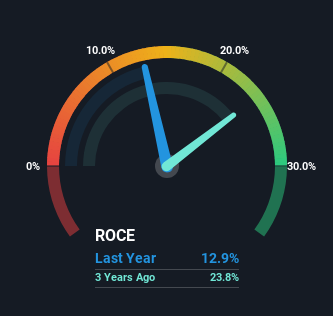- United States
- /
- Specialty Stores
- /
- NYSE:ABG
Here's What's Concerning About Asbury Automotive Group's (NYSE:ABG) Returns On Capital

Did you know there are some financial metrics that can provide clues of a potential multi-bagger? In a perfect world, we'd like to see a company investing more capital into its business and ideally the returns earned from that capital are also increasing. If you see this, it typically means it's a company with a great business model and plenty of profitable reinvestment opportunities. Although, when we looked at Asbury Automotive Group (NYSE:ABG), it didn't seem to tick all of these boxes.
Return On Capital Employed (ROCE): What Is It?
For those that aren't sure what ROCE is, it measures the amount of pre-tax profits a company can generate from the capital employed in its business. To calculate this metric for Asbury Automotive Group, this is the formula:
Return on Capital Employed = Earnings Before Interest and Tax (EBIT) ÷ (Total Assets - Current Liabilities)
0.13 = US$977m ÷ (US$10b - US$2.6b) (Based on the trailing twelve months to September 2024).
Therefore, Asbury Automotive Group has an ROCE of 13%. By itself that's a normal return on capital and it's in line with the industry's average returns of 13%.
Check out our latest analysis for Asbury Automotive Group

In the above chart we have measured Asbury Automotive Group's prior ROCE against its prior performance, but the future is arguably more important. If you'd like, you can check out the forecasts from the analysts covering Asbury Automotive Group for free.
So How Is Asbury Automotive Group's ROCE Trending?
In terms of Asbury Automotive Group's historical ROCE movements, the trend isn't fantastic. To be more specific, ROCE has fallen from 21% over the last five years. Although, given both revenue and the amount of assets employed in the business have increased, it could suggest the company is investing in growth, and the extra capital has led to a short-term reduction in ROCE. If these investments prove successful, this can bode very well for long term stock performance.
On a side note, Asbury Automotive Group has done well to pay down its current liabilities to 25% of total assets. So we could link some of this to the decrease in ROCE. What's more, this can reduce some aspects of risk to the business because now the company's suppliers or short-term creditors are funding less of its operations. Some would claim this reduces the business' efficiency at generating ROCE since it is now funding more of the operations with its own money.
In Conclusion...
Even though returns on capital have fallen in the short term, we find it promising that revenue and capital employed have both increased for Asbury Automotive Group. And the stock has done incredibly well with a 120% return over the last five years, so long term investors are no doubt ecstatic with that result. So should these growth trends continue, we'd be optimistic on the stock going forward.
Asbury Automotive Group does come with some risks though, we found 4 warning signs in our investment analysis, and 1 of those can't be ignored...
While Asbury Automotive Group isn't earning the highest return, check out this free list of companies that are earning high returns on equity with solid balance sheets.
New: Manage All Your Stock Portfolios in One Place
We've created the ultimate portfolio companion for stock investors, and it's free.
• Connect an unlimited number of Portfolios and see your total in one currency
• Be alerted to new Warning Signs or Risks via email or mobile
• Track the Fair Value of your stocks
Have feedback on this article? Concerned about the content? Get in touch with us directly. Alternatively, email editorial-team (at) simplywallst.com.
This article by Simply Wall St is general in nature. We provide commentary based on historical data and analyst forecasts only using an unbiased methodology and our articles are not intended to be financial advice. It does not constitute a recommendation to buy or sell any stock, and does not take account of your objectives, or your financial situation. We aim to bring you long-term focused analysis driven by fundamental data. Note that our analysis may not factor in the latest price-sensitive company announcements or qualitative material. Simply Wall St has no position in any stocks mentioned.
About NYSE:ABG
Asbury Automotive Group
Operates as an automotive retailer in the United States.
Undervalued with mediocre balance sheet.
Similar Companies
Market Insights
Community Narratives




